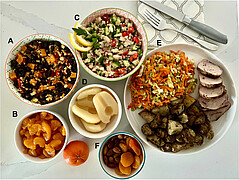"Restore-Diät": Werte für Cholesterin, Blutzucker und Entzündungen niedrig halten [29.01.25]
Prof. Stephan Bischoff's Team beteiligt an einer aktuell im renommierten CELL Journal veröffentlichten internationalen Studie
Abbildung aus dem Originalartikel: One-days’ worth of food consumed by a participant assigned to the 2000 kcal increment based on calculated caloric requirements. Photo depicts menu items from day 4 of the 4-day rotating menu of the restore diet (approximately 46 g dietary fiber): (A) sweet potato and black bean hash and (B) mandarin oranges (breakfast); (C) quinoa tabbouleh salad and (D) canned pears (lunch); (E) baked pork tenderloin, roasted Jerusalem artichokes and potatoes, and coleslaw (dinner); and (F) dried apricots and almonds (snack). Photo by: A.M.A.
Die Effekte der Restore-Diät auf Darm-Mikrobiom und Gesundheit, welche Lebensmittel geeignet sind und wie sie gesund kombiniert werden, beschreibt Sabine Schütze in einer informativen Zusammenfassung auf den SWR-Webseiten. Hier lesen Sie mehr.
Originalartikel publiziert in CELL Volume 188, Issue 2:
Cardiometabolic benefits of a non-industrialized-type diet are linked to gut microbiome modulation
Highlights
- The restore diet reduced microbiome diversity but enhanced L. reuteri persistence
- The diet redressed several microbiome features altered by industrialization
- The diet induced beneficial changes to microbiota-derived plasma metabolites
- Cardiometabolic benefits of the diet were predicted by microbiome features
Summary
Industrialization adversely affects the gut microbiome and predisposes individuals to chronic non-communicable diseases. We tested a microbiome restoration strategy comprising a diet that recapitulated key characteristics of non-industrialized dietary patterns (restore diet) and a bacterium rarely found in industrialized microbiomes (Limosilactobacillus reuteri) in a randomized controlled feeding trial in healthy Canadian adults. The restore diet, despite reducing gut microbiome diversity, enhanced the persistence of L. reuteri strain from rural Papua New Guinea (PB-W1) and redressed several microbiome features altered by industrialization. The diet also beneficially altered microbiota-derived plasma metabolites implicated in the etiology of chronic non-communicable diseases. Considerable cardiometabolic benefits were observed independently of L. reuteri administration, several of which could be accurately predicted by baseline and diet-responsive microbiome features. The findings suggest that a dietary intervention targeted toward restoring the gut microbiome can improve host-microbiome interactions that likely underpin chronic pathologies, which can guide dietary recommendations and the development of therapeutic and nutritional strategies.
Graphical abstract
Mehr zu Prof. Bischoff's Arbeitsgruppe und Forschung:
Stephan C. Bischoff | Für wissenschaftliche Anfragen:
|
|---|


